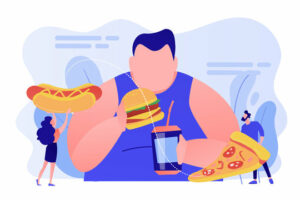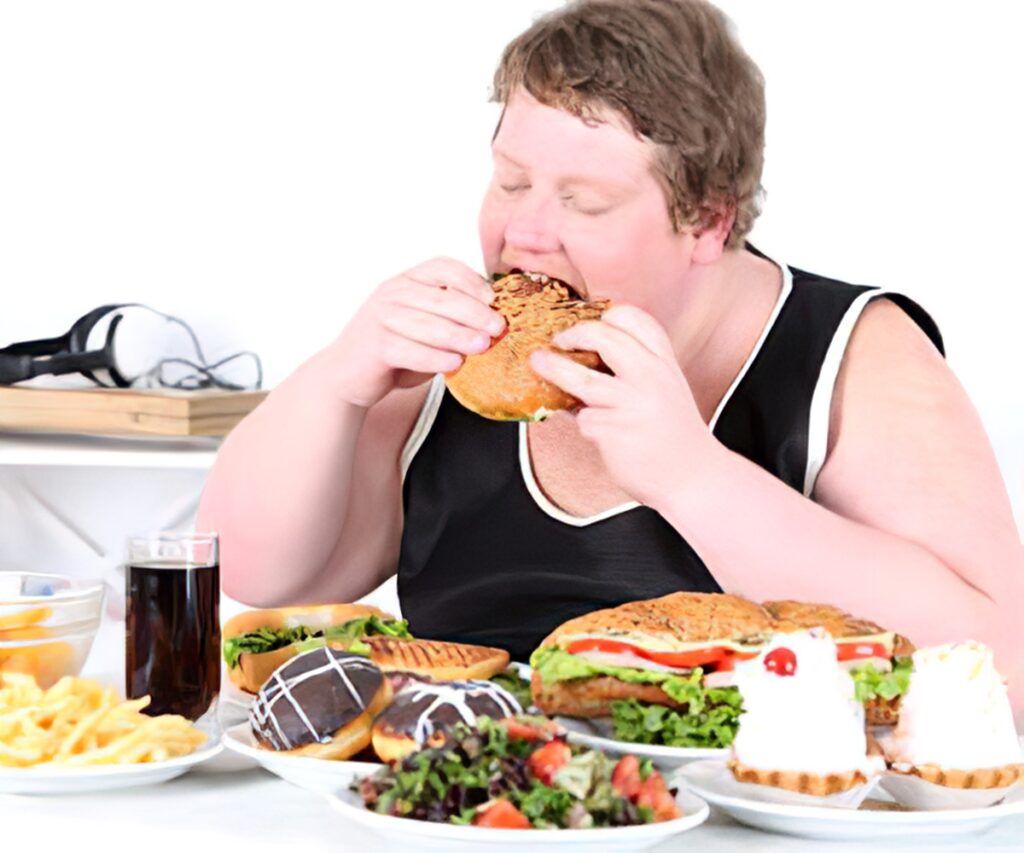Do you ever eat something even though you’re not hungry? Do you find yourself mindlessly snacking throughout the day? If so, then you may be struggling with impulse eating. Impulse eating is when you eat food for reasons other than hunger. You might eat out of boredom, stress, or anger. This can lead to weight gain and a host of other health problems. In this blog post, we will discuss what impulsive eating is and how you can control it!
Contents
Defining Impulse Eating

Impulse eating s when you eat without being hungry. It’s usually in response to emotions like boredom, stress, sadness, or happiness.
Impulse eating is different than emotional eating, which is when you eat in response to your emotions, even if you’re not physically hungry. With impulse eating, there’s no emotional trigger — you just feel like eating for the sake of it. Sometimes, it’s just because the food looks good.
The main difference between the two is that impulse eating is more spontaneous, while emotional eating is usually planned. Impulse eating can also be a form of stress relief.
Sometimes, people use food as a way to cope with negative emotions. This is different than impulse eating, which is more about satisfying a physical craving. Emotional eating is usually done in response to stress, anxiety, or boredom. When you emotionally eat, you’re not necessarily trying to satisfy hunger — you’re using food as a way to cope with your emotions.
Causes of Impulse Eatin
There are many reasons that people may start to develop impulse eating habits. For some, it may be a way to cope with stress or anxiety. Others may turn to food as a form of comfort when they’re feeling down. Whatever the reason, impulse eating can become a dangerous cycle. Here are some common causes of impulse eating:
Boredom
When we’re bored, we often turn to food for entertainment. This is especially true if there’s nothing else to do and we’re stuck at home. Sometimes there maybe be tempting snacks around, which can make it even harder to resist.
Emotional eating
Many of us turn to food when we’re feeling emotional. We may use it as a way to cope with our feelings or numb our emotions. This can be especially true if we’re dealing with something difficult in our lives.
Stress
Stress is another common trigger for impulse eating. When we’re under a lot of pressure, we may seek out comfort in food. We may also find ourselves snacking more often because we’re trying to relieve the tension and stress that we’re feeling.
Depression
Sometimes, people may turn to food as a way to cope with depression. This can be a dangerous cycle, as the act of eating may give temporary relief, but it can also lead to weight gain and further feelings of low self-esteem.
Constant Hunger
If you’re always feeling hungry, it can be hard to resist the urge to snack. This may be due to a medical condition, such as hypoglycemia, or it could be a sign that you’re not eating enough during the day.
Whatever the reason, if you’re constantly feeling hungry, it’s important to talk to your doctor so that you can find a way to control your hunger and avoid impulse eating.
Effects of Impulse Eating

The effects of impulse eating can be both physical and emotional. Some of these can be :
Shame
One such feeling is shame. After eating what you perceive to be “too much,” you might feel disgusted with yourself. This can lead to a spiral of negative thoughts and emotions, which can be hard to break out of.
Guilt is another common emotion associated with impulse eating. You might feel guilty for overindulging, or for eating foods that you normally try to avoid. This guilt can lead to feelings of anxiety and stress, which can further contribute to overeating.
Physical Effects
In addition to the emotional effects, there are also physical effects of impulse eating. These can include:
Weight gain
One of the most obvious physical effects is weight gain. When you eat more calories than your body needs, you will start to put on weight. This can lead to a variety of health problems, such as diabetes, high blood pressure, and heart disease.
Digestive problems
Another physical effect of impulse eating is digestive problems. If you eat too much at once, your stomach might become bloated or uncomfortable. You might also experience indigestion, heartburn, or other gastroesophageal issues.
How To Control Impulsive Eating?

Controlling Impulsive Eating is all about being mindful of your actions and being in the moment.
When you’re feeling an urge to eat impulsively, ask yourself why.
Are you really hungry? Or are you just bored?
Answering this question honestly will help you get to the root of your impulse eating.
Once you know what’s driving your impulsive eating, you can start to take steps to control it.
Some of these ways to overcome it are:
Identify Your Triggers
One of the main ways to control your impulsive eating is to be aware of your triggers. If you know that you tend to eat impulsively when you’re bored, make sure to have other activities on hand that can keep you occupied. This could be anything from reading a book or taking a walk.
Try To Avoid Triggers
You should also try to avoid situations where you know you’ll be tempted to eat impulsively.
For example, if you have a hard time resisting snacking at night, make sure not to keep any junk food in the house.
Out of sight, out of mind! Also, try not to go grocery shopping when you’re hungry.
Change Your Environment
If you find yourself eating impulsively in a particular place, such as at work or in front of the TV, try to change your environment. This could mean eating in a different spot or even going for a walk instead of sitting down.
Focus on Your Breathing
When you’re feeling an urge to eat impulsively, take a few deep breaths and focus on your breath. This will help you relax and may just be enough to distract you from your impulsive eating.
Controlling your impulsive eating is all about being mindful of your actions and being in the moment. If you can do this, you’ll be well on your way to conquering your impulsive eating habits!
Plan Your Meals & Snacks Ahead Of Time
Another way to control your impulsive eating is by planning your meals and snacks ahead of time. This way, you’ll know exactly what you’re supposed to be eating and when.
If you find yourself snacking more often than you’d like, try pre-portioning your snacks into small bags or containers. This will help you control how much you’re eating and prevent you from overeating.
Try To Eat Slowly & Mindfully
Eating slowly and mindfully is another great way to control your impulsive eating.
When you eat mindfully, you’re paying attention to what you’re eating and how it makes you feel. This can help you be more in tune with your hunger cues and prevent you from overeating.
Try to chew each bite of food slowly and savor the flavor. You may find that you don’t even want to eat as much as you thought!
Use A Food Journal To Track Your Eating Habits
Tracking your eating habits can also help control your impulsive eating.
A food journal can help you become more aware of when, why, and how often you’re eating impulsively.
Once you have this information, you can start to look for patterns and work on ways to change your habits.
For example, if you notice that you always eat impulsively when you’re stressed, try to find other ways to deal with your stress instead of turning to food.
Conclusion
Controlling impulsive eating is all about being mindful of your actions and being in the moment. If you can do this, you’ll be well on your way to conquering your impulsive eating habits!
Planning, avoiding triggers, and changing your environment are all great ways to control impulsive eating. But perhaps the most important thing is to be aware of your triggers and learn to control your impulses. With a little bit of effort, you can overcome impulsive eating!
Hope this article was of help to you! If you are suffering from mental health disorders, you may seek help from Therapy Mantra. We have a team of highly trained and experienced therapists who can provide you with the tools and skills necessary for overcoming mental health disorders. Contact us today to schedule an online therapy or download our free Android or iOS app for more information.


